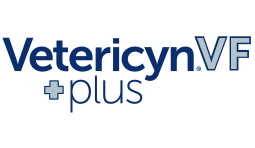VETERICYN® PLUS VETERINARY FORMULA FREQUENTLY ASKED QUESTIONS
Below are Frequently Asked Questions (FAQs) from professional users of Vetericyn® Plus. Please select the FAQ topic of interest to you to review those Frequently Asked Questions.
Please take a moment to contact us if you don’t find your question answered below. We will respond to your inquiry as soon as possible.
